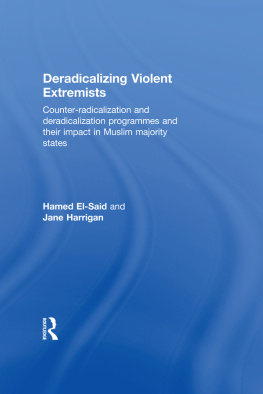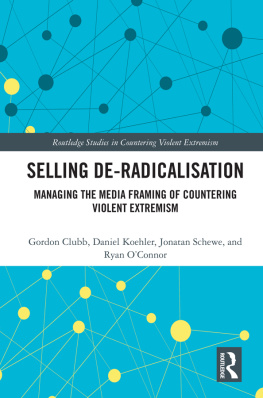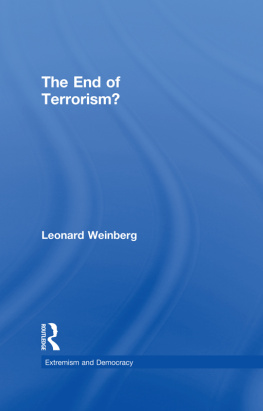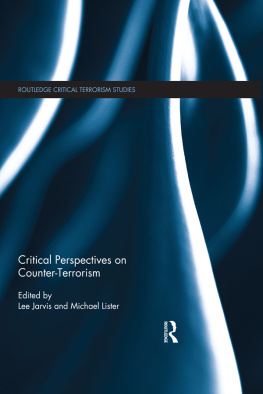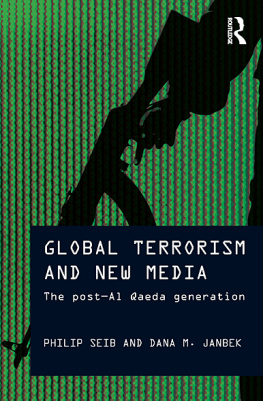Deradicalizing Violent Extremists
Terrorism remains one of the major threats facing the world community. While literature on the subject is dominated by discussion of the factors leading individuals and groups to join violent extremist, terrorist groups, the question of what can lead them to disengage from such groups is an equally important one. This book is the first study to provide a detailed analysis of both counter-radicalization and deradicalization programmes in eight Muslim-majority states, representing hitherto one of the largest, detailed, and most systematic inventories of such programmes in the world.
Drawing on detailed case-studies from a number of countries, the book:
- traces the historical evolution of violent extremist groups and individuals in each country case study, including the period before independence;
- describes in detail states responses to this phenomenon in each period;
- provides important empirical analyses for counter-and-deradicalization policies and programmes based on extensive fieldwork and interviews with state officials, former radicals, and members of civil society organizations in each country;
- provides a first systematic evaluation of the effectiveness and success of these programmes and policies;
- focuses simultaneously on factors that have led to deradicalization at an individual or organizational level, and on the macro environment, both external-global and internal, that encourages counter-radicalization and deradicalization of groups and individuals.
The detailed comparative analyses allow the reader to identify conditions, both internal and external, which are conducive to both success and failure of counter-radicalization and deradicalization programmes, and the authors identify best practice and provide policy implications for states facing threats from violent extremism, as well as for international institutions and organizations working in the field of counter-terrorism.
Hamed El-Said is Chair and Professor of International Political Economy at Manchester Metropolitan University Business School.
Jane Harrigan is Professor of Economics at the School of Oriental and African Studies, University of London.
First published 2013
by Routledge
2 Park Square, Milton Park, Abingdon, Oxon OX14 4RN
Simultaneously published in the USA and Canada
by Routledge
711 Third Avenue, New York, NY 10017
Routledge is an imprint of the Taylor & Francis Group, an informa business
2013 Hamed El-Said & Jane Harrigan
The right of Hamed El-Said & Jane Harrigan to be identified as authors of this work has been asserted by them in accordance with sections 77 and 78 of the Copyright, Designs and Patents Act 1988.
All rights reserved. No part of this book may be reprinted or reproduced or utilised in any form or by any electronic, mechanical, or other means, now known or hereafter invented, including photocopying and recording, or in any information storage or retrieval system, without permission in writing from the publishers.
Trademark notice: Product or corporate names may be trademarks or registered trademarks, and are used only for identification and explanation without intent to infringe.
British Library Cataloguing in Publication Data
A catalogue record for this book is available from the British Library
Library of Congress Cataloging in Publication Data
El-Said, Hamed.
Deradicalizing violent extremists : counter-radicalization and deradicalization programmes and their impact in Muslim majority states / Hamed El-Said & Jane Harrigan.
p. cm.
Includes bibliographical references and index.
ISBN 978-0-415-52519-0 (hardback) ISBN 978-0-415-52520-6 (pbk.) ISBN 978-0-203-10324-1 (e-book) 1. TerrorismIslamic countries.
2. TerrorismPrevention. 3. RadicalismReligious aspectsIslam.
I. Harrigan, Jane. II. Title.
HV6433.I74E4 2012
363.32516091767dc23
2012006467
ISBN: 978-0-415-52519-0 (hbk)
ISBN: 978-0-415-52520-6 (pbk)
ISBN: 978-0-203-10324-1 (ebk)
Typeset in Bembo
by Taylor and Francis Books Ltd
Printed and bound in Great Britain by the MPG Books Group
Contents
Hamed El-Said
Hamed El-Said
Jane Harrigan
Jane Harrigan and Hamed El-Said
Hamed El-Said
Jane Harrigan
Hamed El-Said
Hamed El-Said and Richard Barrett
Hamed El-Said
Hamed El-Said
Unlike a journal article, a newspaper column or a conference paper, important as they might be, books are peculiar products in the sense that they require a long time to write. They also demand and rely on a far greater deal of assistance from others. This is especially the case when they involve more than one author, thus calling for a tremendous amount of coordination, imposition of strict deadlines and strong constraints. This book is no exception.
We are particularly indebted to the Norwegian Ministry of Foreign Affairs, whose generous financial assistance made it possible to start and complete this first volume on Deradicalizing Violent Extremists: Counter-Radicalization and Deradicalization Programmes and their Impact in Muslim-Majority States. Without the generosity of the NMFA, this book together with two other major international conferences, which provided important feedback that allowed us to refine our analysis and update the material of the book, would not have taken place. The first conference was held in Amman in the Arab Thought Forum (March 2010) under the kind patronage of HRH Prince Hassan bin Talal of Jordan, while the second took place in New York in the prestigious International Peace Institute (IPI) (June 2011). Both conferences hosted key policy makers, state officials and experts in the subject, whose comments and views have been vital in shaping the contours of the book. To all these individuals, we are also grateful.
A large debt of gratitude is held in the capitals of the countries which are represented in this book, particularly in Algeria, Amman, Cairo, Dhaka, Kuala Lumpur, Rabat, Riyadh and Sanaa. It would have been literally impossible to write this book without the commitment, dedication and enthusiasm of officials in these countries. Not only were they extraordinarily cordial, sociable and tolerant of our sometimes repetitive and sensitive questions, but also open and honest in explaining to us what was/is going on in their world of radicalization and counter-radicalization, as well as the delicate and complex prison environment. They welcomed us and facilitated our fieldwork, and were willing to share their knowledge and expertise with us. They kindly and magnanimously gave us a great deal of their time and patience. Their generosity and liberality knew no bounds.
A special debt is owed to Richard Barrett, the Coordinator of the United Nations 1267 Al-Qaeda Taliban Monitoring Team. Richards rich personal network of connections in Muslim-majority states facilitated fieldwork for this book in the eight countries represented in this volume.
Our appreciation also extends to both Elaine Mercer and Tom Buckley, who edited the manuscript after the fieldwork and analyses were completed and helped to put the material together in its current form.
We are extremely grateful to all of those mentioned above as well as to the imams, scholars, scientists and civil society organizations involved in countering radicalization and deradicalizing those who crossed the line by committing or intending to commit violent extremist acts. As this book goes to show, they are a significant and an integral part of any effective and successful counter-radicalization and deradicalization genre. Their input and opinions on what works, how, when and where have furnished this book with a vital foundation upon which more assertive conclusions have been built and developed. Like their state officials, civil society entities have also astonishingly, generously and proudly provided ample information on their efforts in this genre.

